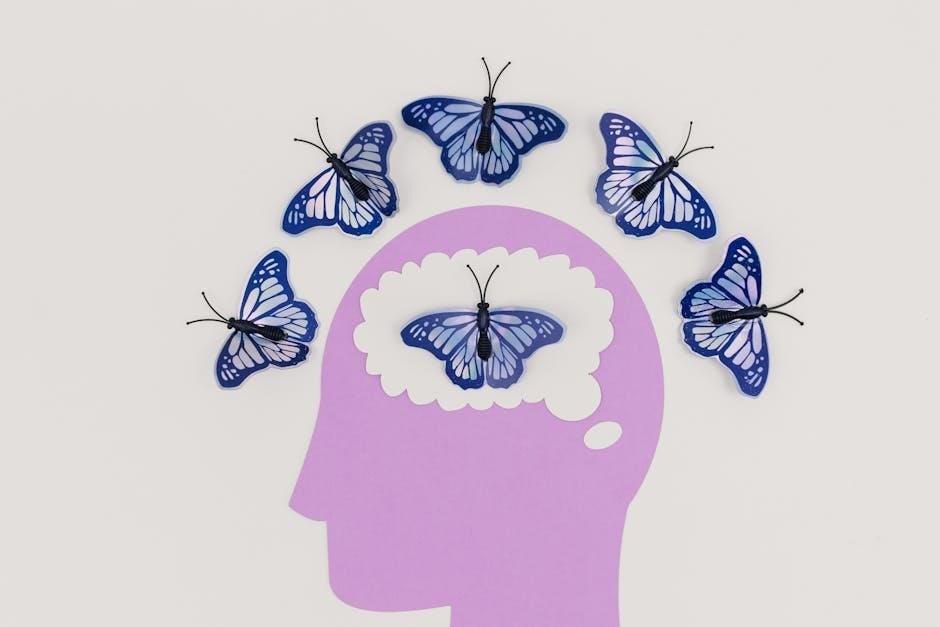abnormal psychology nolen-hoeksema pdf
Abnormal psychology explores unusual patterns of thought, emotion, and behavior, defining what constitutes mental disorders. It examines distress, dysfunction, and cultural deviations, focusing on understanding and classifying psychological conditions to improve mental health care, as highlighted in Nolen-Hoeksema’s foundational work.
Definition and Scope of Abnormal Psychology
Abnormal psychology is the study of mental disorders, focusing on patterns of thought, emotion, and behavior that cause distress or dysfunction. It defines abnormality based on criteria like deviation from norms, distress, and impairment in functioning. The field examines cultural, biological, and psychological factors influencing mental health, aiming to classify and understand disorders for effective treatment. As highlighted in Nolen-Hoeksema’s work, abnormal psychology integrates research and clinical practice to address mental health challenges comprehensively.
The scope extends to diagnosing and treating conditions like depression and anxiety, emphasizing evidence-based approaches. It also explores ethical considerations in mental health care, ensuring interventions are culturally sensitive and respectful. By understanding abnormal behavior, psychologists develop strategies to improve well-being and quality of life for individuals struggling with mental health issues, aligning with the principles outlined in the DSM-5 and Nolen-Hoeksema’s research.
Historical Development of Abnormal Psychology
Abnormal psychology has evolved from ancient beliefs in demonology to modern scientific approaches. Early theories attributed mental disorders to supernatural forces, while later, asylums emerged in the 18th century. The 20th century saw the rise of psychoanalysis and behavioral theories. Biological models gained prominence with advancements in neuroscience. Nolen-Hoeksema’s work reflects this evolution, integrating psychological and biological perspectives. Historical developments have shaped diagnostic systems like the DSM-5, emphasizing evidence-based practices and cultural sensitivity in understanding mental health.

The Nolen-Hoeksema PDF and Its Significance
The Nolen-Hoeksema PDF is a foundational resource in abnormal psychology, providing insights into mental disorders, cognitive-behavioral approaches, and evidence-based treatments, significantly influencing education and practice.
Overview of the Nolen-Hoeksema Textbook
The Nolen-Hoeksema textbook is a cornerstone in abnormal psychology, offering a comprehensive exploration of mental disorders. It integrates research, theories, and real-world applications, emphasizing cognitive-behavioral frameworks. The text covers the full spectrum of psychological conditions, from anxiety and depression to personality disorders, providing accessible explanations; Its structured approach helps students and professionals understand the complexities of mental health. Cited extensively, this resource remains pivotal in education and practice, bridging theory with practical insights.
Key Contributions to Abnormal Psychology
Nolen-Hoeksema’s work has significantly advanced abnormal psychology by integrating cognitive-behavioral theories and empirical research. Her studies on depression, particularly the role of rumination, have reshaped understanding of mental health. The textbook emphasizes evidence-based approaches, cultural considerations, and ethical practices, offering a holistic view of psychological disorders. It bridges theory and practice, making it an essential resource for educators and practitioners, fostering a deeper understanding of mental health challenges and their treatment.
Theoretical Perspectives in Abnormal Psychology
Abnormal psychology integrates biological, cognitive, and behavioral models to explain mental disorders. Nolen-Hoeksema’s work emphasizes cognitive processes, particularly rumination, in understanding psychopathology, bridging theory with clinical applications effectively.
Behavioral Model of Abnormal Behavior
The behavioral model focuses on learning and environmental factors in shaping abnormal behavior. It suggests that maladaptive behaviors are acquired through conditioning and reinforced by external stimuli. According to Nolen-Hoeksema, behavioral patterns, such as avoidance or rumination, can exacerbate psychological distress. This perspective emphasizes observable behaviors and external influences, offering practical interventions like cognitive-behavioral therapy to address and modify harmful behavior patterns effectively.
Cognitive Model of Abnormal Behavior
The cognitive model emphasizes the role of thought processes in abnormal behavior. It proposes that distorted or irrational thinking leads to maladaptive emotions and behaviors. Nolen-Hoeksema highlights how cognitive distortions, such as catastrophizing or overgeneralization, contribute to disorders like depression and anxiety. This model focuses on identifying and challenging negative thought patterns to promote emotional and behavioral change, offering a foundation for therapies like cognitive-behavioral therapy (CBT) to address psychological distress effectively.
Biological Model of Abnormal Behavior
The biological model attributes abnormal behavior to physiological factors, such as genetic predispositions, neurotransmitter imbalances, and brain structure abnormalities. It emphasizes the role of biological processes in mental disorders, supported by research on neurochemistry and genetics. This perspective underpins treatments like medication and neurotherapy. Nolen-Hoeksema’s work acknowledges biological contributions, particularly in mood disorders, highlighting the interplay between biological and psychological factors in understanding mental health conditions and developing effective interventions.

Diagnostic Process in Abnormal Psychology
The diagnostic process involves identifying abnormal behavior through standardized criteria, classification systems, and clinical assessments, ensuring accurate identification and differentiation of mental disorders, guided by cultural sensitivity.
Overview of the Diagnostic Process
The diagnostic process in abnormal psychology involves systematically identifying and classifying mental disorders. It begins with clinical interviews and assessments to gather information about symptoms, behavior, and history. Standardized criteria, such as those in the DSM-5, guide the classification of disorders. Cultural factors and individual differences are considered to ensure accurate diagnosis. This process aims to differentiate normal variations from pathological conditions, providing a foundation for effective treatment and mental health care.
Role of the DSM-5 in Diagnosis
The DSM-5 serves as a standardized manual for diagnosing mental disorders, providing clear diagnostic criteria and classification systems. It ensures consistency among professionals, aiding in accurate identification of conditions. The DSM-5 incorporates cultural considerations and updated research, enhancing diagnostic reliability. By offering a common language, it facilitates communication and treatment planning, making it an essential tool in abnormal psychology and clinical practice, as referenced in Nolen-Hoeksema’s discussions on diagnostic processes.
Clinical Interviews and Assessment Tools
Clinical interviews and assessment tools are crucial in diagnosing mental disorders, providing detailed insights into symptoms and patient histories. Structured interviews ensure consistency, while unstructured ones allow for personalized exploration. Standardized questionnaires and rating scales, like the Hamilton Depression Scale, quantify symptoms. Behavioral observations and mental status exams assess cognitive and emotional functioning. These tools enhance diagnostic accuracy and guide treatment planning, complementing DSM-5 criteria. They are essential for comprehensive evaluations in abnormal psychology, as emphasized in Nolen-Hoeksema’s research.

Anxiety Disorders
Anxiety disorders involve excessive fear or anxiety, interfering with daily life. They encompass conditions like generalized anxiety and panic disorder, significantly impacting mental health and well-being.
Generalized Anxiety Disorder
Generalized Anxiety Disorder (GAD) is characterized by excessive, uncontrollable worry about everyday things, lasting at least six months. Symptoms include restlessness, fatigue, difficulty concentrating, irritability, and sleep disturbances. It often impacts daily functioning and is diagnosed using DSM-5 criteria. Nolen-Hoeksema’s research highlights the role of cognitive processes in maintaining anxiety. Treatment typically involves therapies like CBT, which addresses maladaptive thought patterns. Early intervention is crucial to improve quality of life and reduce long-term complications associated with chronic anxiety.
Panic Disorder and Agoraphobia
Panic Disorder involves recurrent panic attacks—sudden episodes of intense fear or discomfort. Agoraphobia often follows, where individuals avoid places or situations perceived as triggering panic. Both conditions significantly impair daily functioning. According to Nolen-Hoeksema’s research, cognitive distortions, such as fear of fear, play a central role. DSM-5 criteria emphasize recurrent, unexpected panic attacks and avoidance behaviors. Treatments like CBT and exposure therapy are effective in reducing symptoms and improving quality of life, addressing both the psychological and behavioral aspects of these disorders.

Depressive Disorders
Depressive disorders involve persistent sadness and loss of interest, significantly impairing daily functioning. Nolen-Hoeksema’s research highlights cognitive distortions and rumination as key factors in their development and maintenance.
Major Depressive Disorder
Major depressive disorder is characterized by persistent sadness, loss of interest, and impaired functioning. Nolen-Hoeksema’s research highlights cognitive distortions and rumination as key factors, showing how negative thought patterns prolong depressive episodes. This disorder significantly impacts daily life, often requiring targeted interventions to address underlying cognitive and emotional processes.
Bipolar Disorder
Bipolar disorder is marked by extreme mood swings, including manic highs and depressive lows. Nolen-Hoeksema’s research emphasizes cognitive distortions and emotional dysregulation as central factors. These distortions can exacerbate symptoms, leading to severe impairment in daily functioning. Bipolar disorder often involves cycles of hyperactivity and lethargy, requiring tailored interventions to manage both manic and depressive episodes effectively.
Therapy and Treatment Approaches
Therapy and treatment approaches in abnormal psychology integrate cognitive-behavioral techniques, psychodynamic insights, and biological interventions, emphasizing evidence-based methods to address mental health disorders effectively.
Cognitive-Behavioral Therapy (CBT)
Cognitive-Behavioral Therapy (CBT) is a widely used, evidence-based approach focusing on identifying and changing negative thought patterns and behaviors. It helps individuals understand how thoughts influence emotions and actions, promoting healthier coping strategies. Techniques like cognitive restructuring and behavioral activation are employed to address mental health issues effectively. CBT has been particularly successful in treating disorders such as depression and anxiety, aligning with Nolen-Hoeksema’s emphasis on adaptive strategies to manage symptoms and improve mental well-being.
Psychodynamic Therapy
Psychodynamic therapy focuses on exploring unconscious thoughts and past experiences to understand and address mental health issues. It emphasizes the role of repressed emotions and childhood conflicts in shaping behavior. By bringing these underlying feelings to consciousness, individuals can gain insight and alleviate symptoms. This approach is particularly effective for long-term emotional struggles, encouraging self-reflection and personal growth. Psychodynamic therapy is often used alongside other treatments, offering a deeper understanding of psychological distress and promoting lasting change.
Biological Treatments
Biological treatments focus on addressing mental health issues through medical interventions. These include medications like antidepressants, antipsychotics, and mood stabilizers, which target neurotransmitter imbalances. Techniques such as electroconvulsive therapy (ECT) are also used for severe cases. Advances in neuroscience have led to personalized treatments, such as gene therapy and brain stimulation, offering new hope for managing disorders. These approaches aim to restore brain function and alleviate symptoms, emphasizing the biological roots of psychological distress.

Cultural and Ethical Considerations
Cultural factors significantly influence mental health perceptions and treatments. Ethical issues in research and practice require respect for diversity, informed consent, and confidentiality, ensuring culturally sensitive care.
Cultural Factors in Abnormal Psychology
Cultural factors play a crucial role in shaping mental health beliefs and practices. Different cultures have varying norms and values that influence perceptions of abnormal behavior. For instance, some cultures may view certain behaviors as pathological, while others see them as normal. Additionally, cultural background affects help-seeking behavior, with some communities preferring traditional healing methods over formal mental health services. Understanding these cultural nuances is essential for providing effective and culturally sensitive psychological interventions, as highlighted in Nolen-Hoeksema’s work.
Ethical Issues in Psychological Research and Practice
Ethical issues in abnormal psychology involve balancing research advancements with participant well-being. Principles like informed consent, confidentiality, and beneficence are crucial. Researchers must avoid harm and ensure fairness in participant selection. Cultural sensitivity is also vital to avoid biased interpretations. Ethical guidelines, such as those in the DSM-5, help navigate these challenges, ensuring respect for diverse populations and promoting responsible psychological practice, as emphasized in Nolen-Hoeksema’s discussions on ethical considerations in mental health research and clinical interventions.

Research Methods in Abnormal Psychology
Research methods in abnormal psychology include case studies, longitudinal studies, and experiments, providing insights into mental health disorders and their underlying causes, as discussed in Nolen-Hoeksema’s work.
Types of Research Designs
Research designs in abnormal psychology include case studies, longitudinal studies, and experiments. Case studies provide in-depth analysis of individuals, while longitudinal studies track changes over time. Experiments test causal relationships between variables. These designs help understand mental health disorders, their progression, and treatment efficacy, as discussed in Nolen-Hoeksema’s work, which emphasizes empirical methods to advance psychological knowledge and improve diagnostic accuracy in clinical practice.
Statistical Analysis in Psychological Research
Statistical analysis is crucial in abnormal psychology research for interpreting data and drawing meaningful conclusions. Techniques like correlation, regression, and hypothesis testing help identify patterns and relationships between variables. These methods validate findings, ensuring reliability and generalizability. In Nolen-Hoeksema’s work, statistical analyses supported theories on depression and cognitive processes. Such analyses are essential for advancing understanding of mental disorders, informing diagnostic criteria, and evaluating treatment efficacy, ultimately enhancing mental health care practices.

Future Directions in Abnormal Psychology
Advancements in neuroscience and AI are revolutionizing mental health care, offering personalized treatments. Cultural sensitivity and global perspectives are becoming integral to modern psychological practices and research.
Emerging Trends and Technologies
Emerging trends in abnormal psychology include advancements in AI-driven diagnostic tools and personalized therapies. Neuroscience and neuroimaging technologies are enhancing understanding of mental disorders. Telehealth platforms are expanding access to care, while virtual reality aids in exposure therapy. Biomarkers and genetic research are paving the way for precision medicine. These innovations, alongside cultural adaptations, promise more ethical and effective global mental health solutions, as highlighted in recent psychological research and Nolen-Hoeksema’s insights.
Implications for Mental Health Care
Advancements in abnormal psychology, as discussed in Nolen-Hoeksema’s work, highlight the need for evidence-based treatments and cultural sensitivity in mental health care. Integrating research into practice ensures more effective interventions, addressing ethical concerns and promoting equity. Staying updated on emerging trends and technologies is crucial for psychologists to deliver compassionate and personalized care, ultimately improving mental health outcomes and reducing stigma surrounding psychological disorders.
